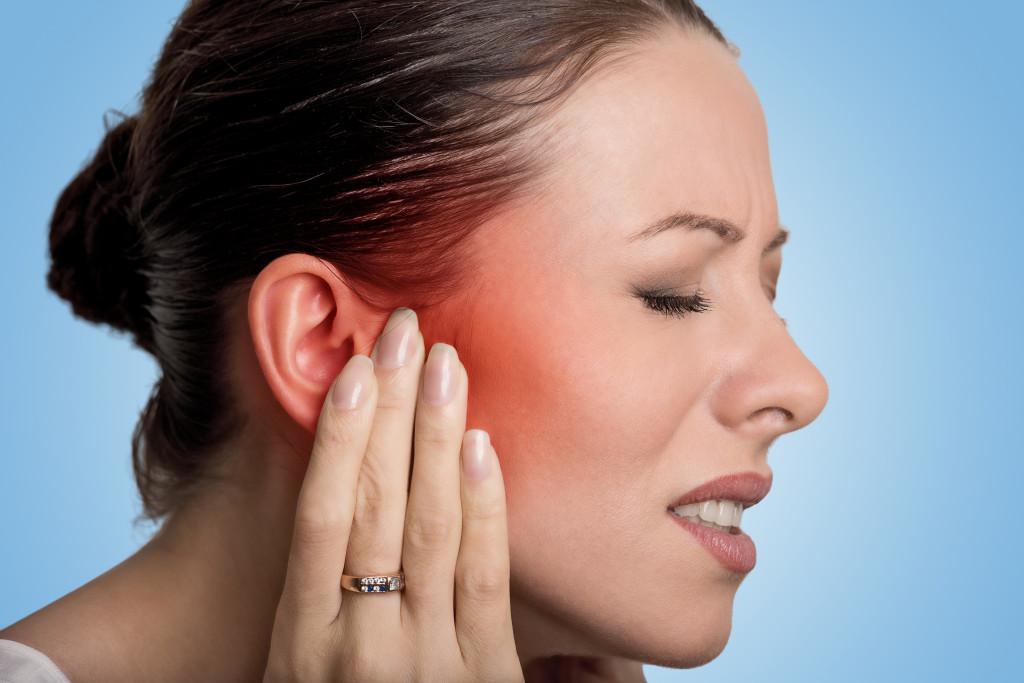- Otitis media is a condition that affects the middle ear, caused by bacterial or viral infections.
- The prevalence of otitis media is 11% among children and 5% among adults.
- Common symptoms include pain, difficulty hearing, pus drainage, fever, headache, and dizziness.
- Causes include bacteria/viruses, allergies, structural issues, smoking, and weakened immune systems.
- Treatment options include medication, surgery, home remedies, and prevention techniques such as ear cleaning and vaccinations.
Most people know little about otitis media, yet it’s the most common condition affecting the middle ear. It’s a childhood condition, and children below three years will likely be diagnosed. However, it can affect anyone regardless of age. Otitis media is a term used to describe inflammation of the middle ear, mainly caused by bacterial or viral infections. It can develop suddenly, and if not treated, it can cause severe complications. Here’s what you need to know about it.
Prevalence of Otitis Media
Otitis media can happen among children, with about 200,000 children having the disease among 1.5 million children tested in the U.K. This has a prevalence rate of around 11%. It can also occur in adults, with some cases reported in the U.S. The prevalence rate for adult otitis media is around 5%.
Symptoms of Otitis Media
If you’re experiencing pain and difficulty hearing, especially in noisy environments. In that case, you might be suffering from otitis media. Other common symptoms include drainage of pus, fever, headache, vomiting, and dizziness. These symptoms can develop or worsen rapidly; seeking medical attention immediately is essential.
Causes of Otitis Media
Various risk factors cause most cases of otitis media. Here are some of them:
Bacteria and Viruses
The most common cause of otitis media is bacteria or viruses. These can get into your middle ear through the Eustachian tube, which connects your middle ear to your nose and throat. Infections in your nose or throat can cause swelling and blockages in the Eustachian tube, leading to otitis media. Common cold and flu viruses are often the culprits behind ear infections.

Allergies
Allergies can also cause swelling and blockages in the Eustachian tube. This can cause fluid buildup and lead to otitis media. Allergies can be seasonal or caused by specific foods or substances.
Structural Issues
Structural issues within the ear, such as a cleft palate, can also lead to otitis media. These issues can cause fluid to accumulate in the middle ear, leading to an infection.
Smoking
Smoking or secondhand smoke exposure is one of the most common preventable causes of otitis media. Smoke can irritate the Eustachian tube and the lining of the middle ear, leading to inflammation and infection.
Weakened Immune System
A weakened immune system can also make you more susceptible to ear infections. Various factors, including certain medical conditions, medications, and lifestyle habits, can cause this.
Diagnosis of Otitis Media
Diagnosing otitis media mainly involves examining the ear canal and eardrum to check for inflammation, redness, fluid, and any sign of pus. A hearing test may also determine the extent of hearing loss. Your physician will ask you about your symptoms and may also inquire about any underlying condition that may contribute to otitis media.
Treatment for Otitis Media
Thankfully, there are various ways to treat this disease. Here are some of them:

Medication
One of the most common treatments is antibiotics. Antibiotics are usually reserved for bacterial infections, while antiviral medications will be prescribed for viral infections. Ear drops can also reduce inflammation and discomfort in the ear canal.
Surgery
Sometimes, a surgical procedure may be necessary if the infection doesn’t respond to medication or fluid persists in the middle ear. For children, this can involve inserting tubes into their ears to allow drainage and ventilation.
Home Remedies
For mild cases of otitis media that don’t warrant medical attention, there are several home remedies that you can try:
• Warm compresses can help minimize pain and swelling.
• Over-the-counter pain relievers like ibuprofen or acetaminophen can be taken to reduce discomfort.
• Resting and avoiding loud noises can help with the healing process.
• Increasing fluid intake can help flush out bacteria and soothe sore throats.
Prevention of Otitis Media
Although otitis media is quite prevalent, there are several ways to prevent it:
Get Your Ears Cleaned
Ear wax can store bacteria and viruses over time. This is why you need to get it cleaned occasionally. A micro suction ear wax removal service can do this for you. The service utilizes a gentle suctioning method to safely remove the ear wax and reduce your risk of otitis media.
Vaccination
Getting vaccinated against flu and other infections can help reduce your risk of getting otitis media. Vaccinations are especially important for children, as they’re more prone to developing infections in their middle ears.
Manage Allergies
If you have allergies, you should try to manage them as best as possible. This could include taking medications or avoiding triggers that cause allergic reactions.
Avoid Smoking and Secondhand Smoke Exposure
Smoking has been linked to many health issues, including ear infections. Avoid smoking or exposure to secondhand smoke to reduce the risk of otitis media.
Otitis media can be painful and uncomfortable but can be treated with the right medical attention. It’s essential to get your ears checked regularly by a professional and seek medical help if you experience any of the above-mentioned symptoms. Following these tips can help reduce your risk of getting otitis media.




